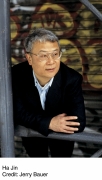
Congratulations on all of your success including a National Book Award, two PEN/Faulkner Awards, an Asian American Literary Award, and the PEN/Hemingway Award.
Q: What was it like growing up in China and serving in the military? Do you believe this experience helped shape you as a writer?
A: At the time it was a better choice to go to the army, because the alternative would be to work in the fields in the countryside. There was a lot of certainty in the military life; we were supposed to fight and die for the country, staying on the border between China and the former Soviet Union. The army did give me a strong sense of discipline, which was essential for a novelist. Once a novel is started, you have to work on it every day no matter how busy you are.
Q: Why did you explore war for your debut collection Ocean of Words?
A: I was new in the States and had no other subject at all. Also, I came upon Isaac Babel’s Red Calvary and enjoyed it greatly, so I wanted to write a collection of army stories in a similar fashion. Babel was a commissar in the red army and wrote for a military newspaper, having to limit his stories to a certain number of words, whereas I didn’t have such a restriction. As I continued writing, I began to lean toward Chekhov’s stories as a source of inspiration, particularly the longer ones of his last decade.
Q: Did you model any characters in Ocean of Words on anyone you know?
A: Yes, a third of them were based on people I knew or met.
Q: Did you expect Ocean of Words to obtain critical success and secure awards such as the PEN/Hemingway Award?
A: Yes, the book had no hardcover originally. Once it got the award, my former publisher, Zoland Books, rebound some paperbacks into hardcovers. Then the collection was picked by Vintage Books, which has kept it in print ever since. In short, the award gave the book a new life.
Q: Tell us about the plot and characters (Yan, Feng) in your newest title The Boat Rocker.
A: Feng, the protagonist, is a whole generation younger than I and is a reporter working for a Chinese-language news agency based on Long Island. His ex-wife, Yan, wrote a cheap novel, taking advantage of people’s memories of 9/11. Feng is determined to expose her, with a touch of vengeance on his part. But what is somewhat personal gets out of hand and offends the Chinese authorities, who intervene and suppress Feng eventually. It is a novel written in a comic style, partly because the subject is too dark and upsetting.
Q: Do you have a favorite Ernest Hemingway story or book?
A: Yes, I like “Hills Like White Elephants” a lot.
Q: Do you remember where you were when you won the PEN/Hemingway Award in 1997?
A: Yes, I just came out of class and got a call from my publisher Roland Peace. I was rather bemused, because I was not a U.S. citizen yet and unqualified for any prizes except for the PEN/Hemingway, which doesn’t require the citizenship. It was a big surprise.
Q: You live in Boston. Do you find you do your best work in the city?
A: No, I prefer the countryside. In fact, we live south of Boston, in the countryside.
Q: Where can your readers keep in touch with you? Do you have a website or social media channel?
A: I have avoided social media. There is already too much for me to tend at school and at home. Since I teach at Boston University, I can be reached via email and phone listed on the Creative Writing Program’s site.